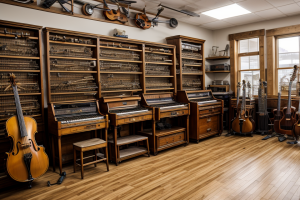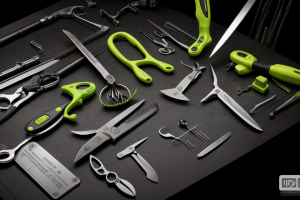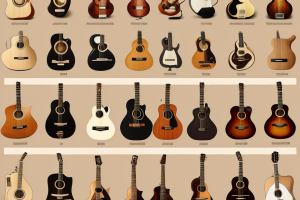
If you’re a trumpet player, you know that this beautiful instrument can be quite delicate and prone to damage. Whether it’s a small ding or a more significant issue, repairs are often necessary to keep your trumpet in top condition. But how much does it cost to fix a trumpet? In this comprehensive guide, we’ll take a closer look at the various factors that can affect the cost of trumpet repairs, from the type of repair needed to the expertise of the repair technician. Whether you’re a beginner or a seasoned pro, this guide will help you understand what to expect when it comes to trumpet repairs and how to budget for them. So, let’s get started!
Factors Affecting Trumpet Repair Costs
Quality of the Trumpet
Premium Brands
When it comes to trumpet repairs, the quality of the instrument can have a significant impact on the cost. Premium brands, such as Bach and Yamaha, are known for their exceptional craftsmanship and superior materials. As a result, repairs on these instruments can be more expensive due to the increased time and effort required by skilled technicians to restore them to their original condition.
Standard Brands
On the other hand, standard brands such as King and Conn are generally more affordable when it comes to repairs. These instruments are still of high quality, but they may not require the same level of expertise and attention as premium brands. However, it is important to note that even standard brand trumpets can still have expensive repair costs if they have complex issues or require specialized parts.
Ultimately, the quality of the trumpet will play a significant role in determining the cost of repairs. While premium brands may be more expensive upfront, they often have a longer lifespan and require fewer repairs over time. Standard brands, while more affordable, may need more frequent repairs and may not have the same resale value as premium brands. It is important to consider these factors when choosing a trumpet and budgeting for potential repairs.
Condition of the Trumpet
Lightly Used
When a trumpet is lightly used, it generally means that it has been well taken care of and has not suffered significant wear and tear. In this case, the repair costs will be lower as there is less damage to fix. Some common repairs for lightly used trumpets include adjusting the valves, cleaning and oiling the slides, and replacing worn or damaged parts such as springs or cork grease. These repairs can typically be done for less than $100, although more extensive repairs or replacements of parts such as the lead pipe or bell may be more costly.
Heavily Used
On the other hand, a heavily used trumpet has suffered significant wear and tear and may require more extensive repairs. Common repairs for heavily used trumpets include replacing the valve casings, pistons, or slides, and repadding or reshaping the mouthpiece cup. These repairs can be more costly, with some repairs running into the hundreds of dollars, depending on the extent of the damage and the parts that need to be replaced. It is important to note that if a trumpet has been poorly maintained or neglected, the repairs may be more costly and time-consuming, potentially requiring a complete overhaul or even replacement of some parts.
Location for Repair
Local Repair Shops
- Lower prices due to competition
- May require longer wait times for repair
- Quality of work may vary
Professional Repair Services
- Higher prices due to expertise and specialized equipment
- Faster turnaround time for repair
- Guaranteed quality of work
It is important to consider the location where the trumpet repair will take place. Local repair shops may offer lower prices due to competition, but this may come at the cost of longer wait times for repair and varying quality of work. On the other hand, professional repair services may charge higher prices due to their expertise and specialized equipment, but they can provide a faster turnaround time for repair and a guaranteed quality of work.
Type of Repair Needed
Minor Adjustments
Minor adjustments refer to small repairs that do not significantly affect the overall functioning of the trumpet. These repairs typically involve minor maintenance tasks such as tightening of screws, adjusting valves, and cleaning of the instrument. The cost of minor adjustments is usually lower compared to major restoration as it requires less time and effort from the repair technician. However, the cost can still vary depending on the complexity of the repair and the expertise of the technician.
Major Restoration
Major restoration, on the other hand, refers to extensive repairs that require more time and effort from the repair technician. These repairs may involve replacing or repairing broken parts, refinishing the instrument, or repairing cracks or damage to the body of the trumpet. Major restoration can be a more costly process as it requires a higher level of expertise and more time to complete. Additionally, the cost of major restoration can also depend on the condition of the trumpet and the extent of the damage.
In conclusion, the type of repair needed is a crucial factor that affects the cost of trumpet repairs. Minor adjustments are typically less expensive compared to major restoration, but the cost can still vary depending on the complexity of the repair and the expertise of the technician. It is important to assess the condition of the trumpet and determine the extent of the damage before deciding on the type of repair needed.
Common Trumpet Repairs and Their Costs
Valve Replacement
Cost Range
The cost of a valve replacement for a trumpet can vary depending on a number of factors, including the type of valve being replaced, the skill level of the technician performing the repair, and the overall condition of the instrument. On average, a valve replacement can cost anywhere from $100 to $500 or more. It’s important to note that some trumpet models may require specialized parts or additional labor, which can increase the overall cost of the repair.
Causes of Valve Issues
Valve issues on a trumpet can arise from a variety of factors, including regular wear and tear, improper maintenance, or even manufacturing defects. One common cause of valve issues is corrosion, which can occur when the valves are not properly cleaned or maintained. This can lead to stiff or sticky valves, which can affect the instrument’s overall performance. Additionally, overuse or improper handling of the valves can cause them to become loose or even break, requiring a valve replacement. It’s important to regularly inspect and maintain the valves on your trumpet to prevent these types of issues from arising.
Piston Replacement
The cost of piston replacement for a trumpet can vary depending on a number of factors, including the make and model of the trumpet, the type of piston being used, and the labor costs associated with the repair. On average, the cost of a piston replacement can range from $200 to $500 or more. It is important to note that some trumpets may require specialized parts or more extensive repairs, which can increase the overall cost.
Causes of Piston Issues
Piston issues can arise due to a variety of reasons, including normal wear and tear, improper maintenance, or damage from impact or other external factors. Over time, the pistons in a trumpet can become dirty or corroded, which can affect their ability to move smoothly and efficiently. Additionally, if the trumpet is not properly maintained or cleaned, the pistons may become stuck or seize up, which can require more extensive repairs. It is important to regularly inspect and maintain the pistons in a trumpet to ensure proper function and avoid costly repairs down the line.
Water Key Replacement
The cost of a water key replacement for a trumpet can vary depending on a number of factors, including the type of water key, the difficulty of the repair, and the labor costs associated with the repair. On average, the cost of a water key replacement can range from $50 to $200. However, in some cases, the cost can be higher if additional repairs are needed or if the water key is made of a rare or hard-to-find material.
Causes of Water Key Issues
Water keys are an essential component of a trumpet, as they help to regulate the flow of air and create the distinctive sound associated with the instrument. Over time, however, water keys can become damaged or worn, leading to a range of issues that can affect the performance of the trumpet. Some common causes of water key issues include:
- Damage from improper cleaning: Trumpets require regular cleaning and maintenance to ensure they are in good working order. However, if the water key is not cleaned properly or if the wrong cleaning solutions are used, it can become damaged or corroded.
- Physical damage: Trumpets are delicate instruments that can be easily damaged if they are not handled properly. Physical damage to the water key, such as dents or cracks, can prevent it from functioning correctly.
- Wear and tear: Over time, the water key can become worn or damaged due to regular use. This can cause a range of issues, including leaks, sticky valves, and poor sound quality.
Regardless of the cause of the issue, a water key replacement is typically necessary to restore the trumpet to its proper working order. It is important to work with a qualified repair technician who can assess the damage and provide an accurate estimate of the cost of the repair.
Mouthpiece Replacement
The cost of a mouthpiece replacement for a trumpet can vary depending on the type of mouthpiece and the material it is made of. Generally, a standard trumpet mouthpiece can cost anywhere from $50 to $150, while custom mouthpieces can cost upwards of $200 or more. It is important to note that additional labor costs may apply if the mouthpiece needs to be installed or adjusted by a professional.
Causes of Mouthpiece Issues
There are several reasons why a trumpet mouthpiece may need to be replaced. Some of the most common causes include:
- Wear and tear: Over time, the mouthpiece can become worn or damaged due to regular use. This can affect the sound quality and playability of the trumpet.
- Poor maintenance: If the trumpet is not properly cleaned and maintained, the mouthpiece can become dirty or clogged with debris, which can also cause issues.
- Damage: A mouthpiece can become damaged due to accidental drops or other types of physical damage.
- Incompatibility: In some cases, a player may simply find that the mouthpiece they are using does not feel comfortable or is not the right size for their mouth, which can lead to difficulties with playing.
It is important to have a qualified trumpet repair professional assess the condition of the mouthpiece and determine if it needs to be replaced. They can also help advise on the best type of mouthpiece for the individual’s playing style and needs.
Trumpet Polishing and Cleaning
The cost of trumpet polishing and cleaning can vary depending on the condition of the instrument and the extent of the cleaning required. On average, the cost can range from $50 to $150 for a professional cleaning and polishing service. However, if the trumpet has been heavily neglected or requires more extensive repairs, the cost may be higher.
Importance of Regular Maintenance
Regular maintenance is crucial for the longevity and performance of a trumpet. Polishing and cleaning the instrument removes any buildup of dirt, grease, and moisture that can affect its sound quality and overall condition. It also helps to prevent the development of rust and corrosion, which can cause irreparable damage to the trumpet if left untreated.
Professional trumpet polishing and cleaning should be done at least once a year, or more frequently if the instrument is used regularly. This can help to ensure that the trumpet stays in good condition and continues to produce a clear, rich sound.
Tips for Saving on Trumpet Repairs
- Regular Maintenance: One of the most effective ways to save on trumpet repairs is to practice regular maintenance on your instrument. This includes cleaning the valves, oiling the keys, and checking for any damages or wear and tear. By keeping your trumpet in good condition, you can prevent small issues from turning into larger, more expensive problems.
- Shopping Around for Repair Services: Another way to save on trumpet repairs is to shop around for repair services. Don’t automatically assume that the first repair shop you find is the best option. Take the time to research different repair shops in your area and compare their prices and services. Look for reviews and recommendations from other musicians to find a reputable and reliable repair service.
- DIY Repairs for Basic Issues: If you have a basic understanding of trumpet repair and maintenance, you may be able to fix some issues on your own. For example, you can replace a worn-out valve spring or tighten a loose screw. While this may not save you a significant amount of money, it can help you avoid small repair bills and keep your trumpet in good condition. However, it’s important to remember that not all repairs can be done by yourself, and for more complex issues, it’s best to seek professional help.
FAQs
1. How much does it cost to fix a trumpet?
The cost of fixing a trumpet can vary depending on the extent of the damage and the parts that need to be replaced. On average, the cost of a basic repair can range from $50 to $150, while more extensive repairs can cost upwards of $500 or more.
2. What kind of repairs are common for trumpets?
Common repairs for trumpets include fixing leaky valves, replacing worn or damaged springs, adjusting the tuning slide, and repairing or replacing the mouthpiece. More extensive repairs may be needed if the trumpet has been dropped or damaged, such as replacing the lead pipe or bell.
3. Can I fix the trumpet myself?
While some minor repairs can be done at home with the right tools and knowledge, it is generally recommended to have a professional trumpet repair person fix any significant issues. This is because a professional will have the necessary tools and expertise to properly diagnose and fix the problem, ensuring that the trumpet is returned to its optimal playing condition.
4. How long does it take to fix a trumpet?
The time it takes to fix a trumpet can vary depending on the extent of the damage and the parts that need to be replaced. Simple repairs, such as fixing a leaky valve, can often be completed in a matter of hours. More extensive repairs, such as replacing the lead pipe or bell, may take several days or even weeks to complete.
5. How do I know if my trumpet needs to be repaired?
If your trumpet is not playing as well as it used to, or if you notice any changes in its sound or performance, it may need to be repaired. Some common signs that a trumpet needs to be repaired include a lack of response, irregular pitch, or a buzzing or hissing sound when played. If you suspect that your trumpet needs to be repaired, it is best to have it checked by a professional trumpet repair person.







